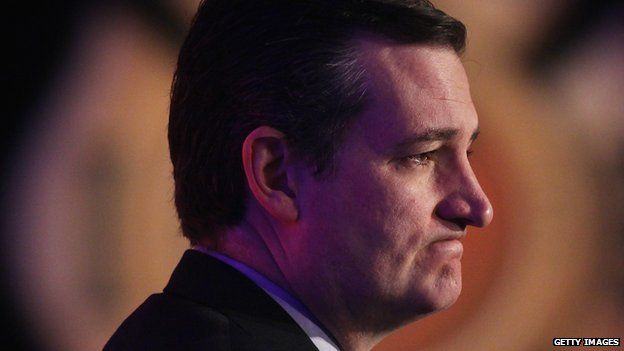Ted Cruz: Five things to know about the 2016 contender
- Published
- comments

Two years ago Ted Cruz was a little known, newly elected US senator from Texas. Now he is one of the favourites for the 2016 Republican presidential nomination.
The senator's fiery manner and aggressive posture first made a name for him in national political circles.
But there's more to him than meets the eye.
Here are five things you should know about the Canadian-born son of a Cuban immigrant.
1. He's an establishment insider in outsider's clothing
Ted Cruz may style himself as an anti-establishment, grass-roots firebrand, but it's a relatively new persona. Mr Cruz has an Ivy League pedigree, having attended Princeton University and Harvard Law School, where he was editor of the Law Review and graduated magna cum laude.
He clerked with the legendary conservative jurist J. Michael Luttig on a US appeals court and for Supreme Court Chief Justice William Rehnquist. He worked on George W Bush's 2000 presidential campaign, held several executive branch jobs in his administration and served as Texas solicitor general, arguing nine cases before the US Supreme Court.
In the two years before he ran for the US Senate, he worked as a partner in the Houston office of the law firm Morgan Lewis, representing deep-pocketed corporate clients and making more than a million dollars a year.
His wife, Heidi Nelson Cruz, is a managing director with the Wall Street titan Goldman Sachs and has served on the Council of Foreign Relations (which Mr Cruz, during a campaign appearance, once called a "pernicious nest of snakes).
2. He's a dangerous underdog
When Mr Cruz ran for the US Senate in 2012, few political prognosticators gave him much of a chance to win. His opponent was David Dewhurst, the sitting lieutenant governor of Texas - generally considered the most powerful office in the state.
Mr Dewhurst's political might and statewide name recognition was matched by his financial muscle, with an estimated $200m personal fortune he used to fund his race.
During the campaign, Mr Cruz painted Mr Dewhurst as an unprincipled moderate. He contrasted the lieutenant governor's occasional compromises with political opponents with his own record as solicitor general, which included defending his state's use of the death penalty, late-term abortion bans and the display of a Ten Commandments monument on the state capitol grounds.
Mr Cruz finished close enough to Mr Dewhurst to force a runoff election after the first round of primary voting, then defeated him by 14% in a low-turnout second matchup.
3. He's a gifted public speaker
Mr Cruz has been a favourite of conservative audiences whenever he appears, usually garnering standing ovations. He likes to prowl the stage, speaking without a teleprompter.
His October 2011 appearance before the Values Voters Summit helped launch him as a national political figure, leading to a cover story in the National Review shortly thereafter.
When he was at Princeton, Mr Cruz was an award-winning debater. In 1992 he won both the US National Debating Championship and the North American Debating Championship. In 1995 he was a semifinalist in the World Universities Debating Championship.
As a teenager, Mr Cruz was a bit of a prodigy. He travelled the state with a group of other high school students, where he would recite the US Constitution from memory at small-town gatherings and big city conservative country clubs.
4. He has already made enemies in Washington
Mr Cruz didn't waste any time making waves as a newly minted US senator. In September 2013 he took the floor of the chamber for 21 hours to protest funding for President Barack Obama's healthcare reform programme.
He also worked closely with a group of hard-core conservatives in the US House of Representatives - over the objections of Republican congressional leadership - encouraging them to force a government shutdown when their demands for a rollback of healthcare reform weren't met.
Arizona Senator John McCain called Mr Cruz one of the "wacko birds" in Congress.
Mr Cruz also has actively supported numerous insurgent Tea Party candidates who have challenged incumbent Republicans. He has said that Republicans have to elect politicians who match their actions with their words.
"The Lord tells us we shall know them by their fruits," Mr Cruz said at the Conservative Political Action Conference (CPAC) in February. "If a candidate tells you they oppose Obamacare, fantastic. When have you stood up and fought against it?"
Mr Cruz's sharp political elbows led ABC's Jonathan Karl to quip he might "need a food taster" when eating lunch with his fellow Senate Republicans.
5. He has a path to the presidency
When Ted Cruz announced his presidential bid in March, he was considered little more than a longshot.
"The most interesting question about Mr Cruz's candidacy is whether he has a very small chance to win or no chance at all," wrote Nate Cohn of the New York Times.
Critics detailed his apparent flaws. He lacked elective experience, with his Senate race being his only appearance on a ballot. He was almost universally reviled among Republican leaders in Washington, who saw him as a political showhorse solely interested in advancing his own interests.
He was running too far to the right in a Republican Party that, when it came to presidential candidates, tended to nominate the moderate, electable option.
So far, however, Cruz has run a dexterous campaign that has focused on both grass-roots and big-donor fundraising and building out a solid ground game in early voting states, particularly Iowa.
He has drafted behind surprise frontrunner Donald Trump and positioned himself to be a more realistic, compromise option for an establishment that fears, more than anything, the New York billionaire's unpredictability and brashness.
He's steadily climbed in the polls and has a political operation built for the long haul.
Ted Cruz may yet fall short of the presidency, but he will be a factor in Republican politics for years to come.